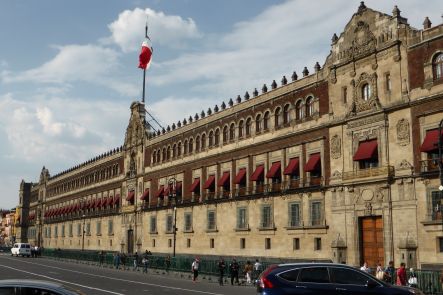
Fitch: Mexico Amparo Bill Could Raise Regulatory Risk
Energy, transportation, telecommunications, mining among most exposed sectors.
BY LATINVEX STAFF
Mexico’s proposed amendments to the Constitutional Appeal Law (Ley de Amparo) could raise regulatory risk by limiting courts’ ability to suspend administrative acts and narrowing eligibility relief, according to Fitch Ratings.
“The bill would affect a wide range of economic activity and reduce predictability for businesses that rely on permits, authorizations and concessions, with potential negative credit implications assessed case by case,” Fitch says, adding that energy, transportation, telecommunications, mining and social infrastructure are the most exposed sectors.
Submitted on Sept. 15, President Claudia Sheinbaum’s proposal, approved by the Senate and under final review in the Chamber of Deputies, would prohibit suspensions when authorities revoke permits, concessions or authorizations, limit injunction effects to the petitioner, and restrict third parties’ ability to claim legitimate interest. Companies have widely used amparos to pause actions perceived as rights-infringing; limiting suspensive relief reduces practical recourse against abrupt policy or administrative shifts and could weigh on competitiveness.
“Fitch believes the passage of the bill would leave issuers whose business models rely on permits and government authorizations more vulnerable to friction with authorities and with fewer reliable protections against unilateral decisions,” it warns. “Greater exposure to adverse administrative actions could disrupt operations, delay projects in progress, reduce revenue and pressure profitability. Over time, it may dampen investment, constrain market access and widen spreads for those most exposed to discretionary actions.”
The law would not apply retroactively, reducing some immediate effects.
PERU: POPULISM RISK GROWS
Although Peru’s brand-new President Jose Jeri swore in Denisse Miralles, a former deputy economy minister with a market-friendly reputation, as economy minister, Fitch Ratinsg warns that the Peruvian Congress’s rapid impeachment and removal of President Dina Boluarte on October 10 underscores the country’s persistent political volatility and increases policy unpredictability ahead of the April 2026 general elections.
“Fitch Ratings sees risks that policy drift and populist measures, as Congress and the executive move into campaigning mode, could complicate fiscal consolidation efforts already facing challenges from weak reform momentum and repeated fiscal rule slippage,” it warns.
Although a center-right cabinet will preserve legislative support for Jeri’s agenda, with roughly six months to elections and no clear popular mandate, the executive’s capacity to resist congressional populism will be limited, Fitch says.
“Congress’s political incentives favor measures with near-term voter appeal (for example, additional pension withdrawals), which would erode fiscal sustainability in the medium term,” it says.
Jeri will serve until July next year after holding elections in April.
MEXICO: DARK CLOUDS
Mexico will be among the three hardest-hit countries as the full effects of Donald Trump’s tariffs take effect, according to Oxford Economics’ TradePrism Q3 2025 Outlook.
“Goods imports are forecast to plunge over 6% in 2026, with suppliers in China, Mexico, and Canada hit hardest,” Harry Murphy Cruise, Head of Global Trade at Oxford Economics and member of the TradePrism team, said in a statement. “Shipments temporarily rerouted through ASEAN and Europe have offered a cushion this year, but analysts warn that weaker American demand and tighter controls on trans-shipments will drag trade volumes lower next year.”
Meanwhile, Brazil’s iron ore, and Chile and Peru’s copper exports, face weaker demand as China slows, Oxford Economics point out.
© Copyright Latinvex












